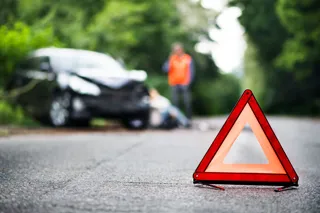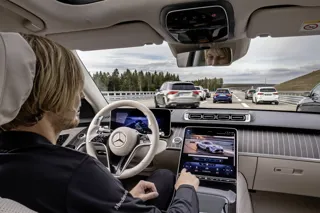The Government has set out changes to The Highway Code before the first self-driving vehicles are introduced on to UK roads.
The plans, which include allowing drivers to watch television while the vehicle is in self-driving mode, are in response to a public consultation,
It will, however, still be illegal to use mobile phones in self-driving mode, given the "greater risk" they pose in distracting drivers, says the Department for Transport (DfT).
The first use of self-driving technology is likely to be allowed when travelling at slow speeds on motorways, such as in congested traffic.
No self-driving cars are currently allowed on UK roads.
Transport minister Trudy Harrison said: “This is a major milestone in our safe introduction of self-driving vehicles, which will revolutionise the way we travel, making our future journeys greener, safer and more reliable.
“This exciting technology is developing at pace right here in Great Britain and we’re ensuring we have strong foundations in place for drivers when it takes to our roads.
“In doing so, we can help improve travel for all while boosting economic growth across the nation and securing Britain’s place as a global science superpower.”
The Government announced last year that the use of “self-driving” driver assistance systems would be permitted on UK roads.
Under the proposals, drivers of vehicles equipped with autonomous lane-keeping systems (ALKS) would be permitted to use them at speeds up to 37mph on motorways.
The Government says it is continuing to develop a full legal framework for self-driving vehicles to enable the safer and greener movement of people and goods in the UK.
It expects to have that framework in place to support the widespread deployment of the technology by 2025.
Mike Hawes, SMMT chief executive, said that amending The Highway Code to reflect the pace of technological change will help “clarify” what motorists can and can’t do when a self-driving feature is engaged, so promoting its safe use.
He added: “The technology could be available in the UK later this year and, with the right regulations in place, consumers are set to benefit from safer, more efficient journeys while the UK will strengthen its position as a global leader in the deployment of self-driving technology.”
The technology, says the DfT, could improve road safety across Britain by reducing human error, which is a contributory factor in 88% of all recorded road collisions.
Steve Gooding, director of the RAC Foundation, said: “The final part of the jigsaw is to ensure these amendments are widely communicated to, and understood by, vehicle owners.
“Vehicle manufacturers and sellers will have a vital role to play in ensuring their customers fully appreciate the capabilities of the cars they buy and the rules that govern them.”
Hojol Uddin, partner and head of motoring law at JMW Solicitors, says that the changes would also have to go through the legislative process.
He explained: “At present the legislation does not allow the use of moving images in a vehicle whilst driving, and attracts penalty points. If they are to adopt this then the legislation will need to change as well as the Highway Code.”
Louis Rix, chief operating officer and co-founder of car finance platform CarFinance 247, also highlighted what he sees as potential problems with consumer confidence.
“The proposals to allow users of self-driving cars to watch TV while driving seems incomprehensibly irresponsible," he said.
"Road users have always expressed concern over the introduction of self-driving cars, and this will be no help in building the confidence of reluctant consumers.
“The Government needs to rely on support and trust from consumers when the first self-driving vehicles are introduced to roads in the UK, but there are likely to be many road users who will actively try and avoid a car they recognise as driverless due to safety concerns.
“While the proposals will say drivers need to be ready to take back control of the vehicle, we must also think of the effects of watching television whilst driving – how often do we find ourselves falling asleep in front of the TV?"
Matthew Avery, chief research strategy officer at Thatcham Research, welcomed the Government's focus on ensuring that drivers understand their legal obligations behind the wheel of any vehicle described as having ‘self-driving capability’.
“Although automation will ultimately make our roads safer, accidents will still occur," said Avery. "Therefore, data must be recorded that shows who was in control at the time of a collision, however minor, and this data must be openly accessible to all stakeholders, not only the carmakers."
The question of who pays when an automated vehicle crashes, however, remains unclear, according to Avery.
"Carmakers and insurers will work together to handle claims where the vehicle is proven to be in self-driving mode and, while Mercedes recently announced that it will accept liability when it’s ‘Drive Pilot’ automated system is engaged, the provision of data will be vital to making sense of collisions and ensuring that legal wrangling does not put a brake on adoption."
Avery explains that the Government's focus on the driver’s legal responsibilities is "important", especially when it comes to taking back control from the system.
"This is an area of risk and it’s important that drivers are aware that they must remain engaged and be ready to resume the driving task at any time," he said.























Login to comment
Comments
No comments have been made yet.